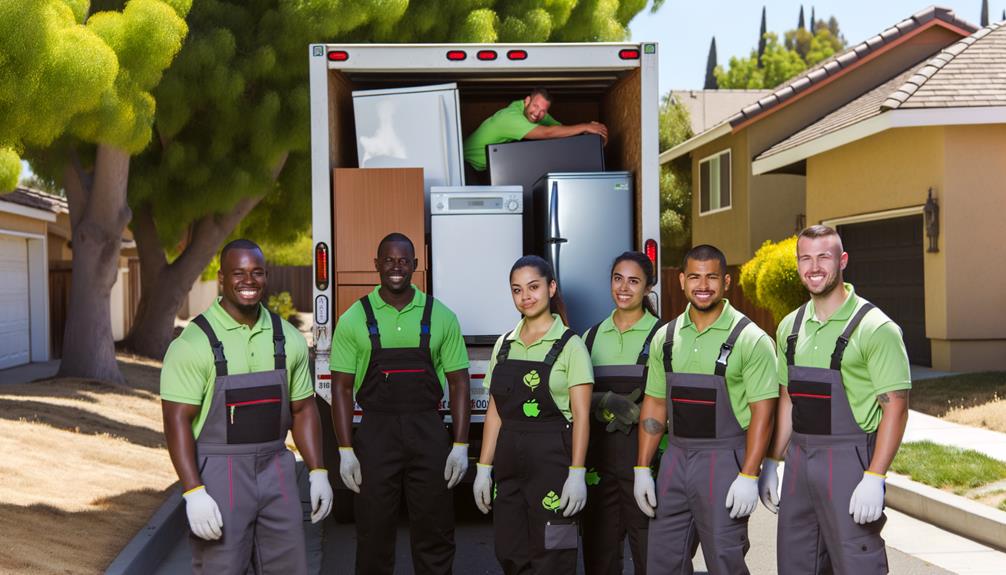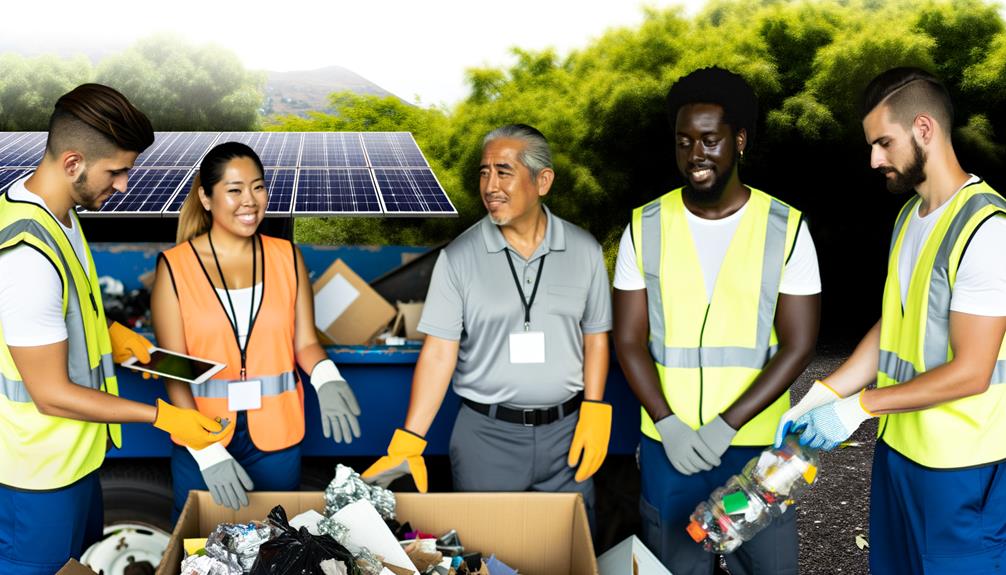Have you ever thought about how eco-friendly waste disposal practices can make a difference in Sacramento? Picture a city where sustainability isn't just a buzzword but a way of life. Sacramento is stepping up its game by composting organic waste and tapping into renewable energy sources for a greener future. Curious about the cutting-edge technologies being used to tackle waste management challenges in our city? Let's dive into the exciting advancements in eco-friendly waste disposal methods that are reshaping Sacramento's environmental landscape.
Key Takeaways
Sacramento is all about going green when it comes to waste disposal. One way they're doing this is by promoting composting. Not only does it help reduce methane emissions, but it also creates nutrient-rich soil for our gardens. The city is also big on recycling paper, plastic, and glass to cut down on landfill waste.
To tackle greenhouse gas emissions, Sacramento is embracing renewable energy sources like solar and wind power. This not only helps the environment but also reduces our carbon footprint. Waste-to-energy technology is another cool initiative here. It converts organic waste into renewable energy, which is a win-win for cutting down on harmful emissions.
Educating the public is key, and Sacramento does it well. They have programs that focus on sustainability, recycling, and conservation practices. It's all about making a difference and being mindful of our environment.
Composting Organic Waste
Composting organic waste in Sacramento is a simple way to help the environment and reduce harmful methane emissions from landfills. You can easily compost food scraps like fruits and veggies, along with yard waste such as grass clippings and leaves. Instead of letting these materials rot in landfills and produce methane, composting turns them into nutrient-rich soil that benefits plants and reduces the need for chemical fertilizers.
When organic waste breaks down in landfills, it releases methane, a potent greenhouse gas. By composting these materials at home or through community programs, you play a part in lowering these emissions and promoting sustainable waste management practices. Sacramento residents are encouraged to join in composting efforts to make a positive impact on the environment.
Composting not only helps reduce methane emissions but also provides a natural solution for handling organic waste. Rather than adding to greenhouse gas production in landfills, composting transforms food and yard waste into a valuable resource for soil health. It's a rewarding way to give back to the environment while supporting healthier plant growth in your own backyard.
Recycling Paper, Plastic, Glass
Sacramento County makes it easy for residents to recycle paper, plastic, and glass through its curbside recycling program. By properly disposing of these materials, you play a part in keeping our environment clean. Here's a simple guide to what you can recycle:
- Paper: You can recycle clean and dry newspapers, magazines, cardboard, and office paper.
- Plastic: Look for recycling symbols on plastic containers; these are accepted for recycling, but please exclude plastic bags and Styrofoam.
- Glass: Acceptable items include glass bottles and jars without lids. Unfortunately, broken glass and ceramics cannot be recycled.
Join us in making a positive impact on our community and the planet by participating in the recycling program. Let's work together to create a more sustainable future for all!
Renewable Energy Sources
When it comes to boosting Sacramento's efforts in eco-friendly waste disposal, it's crucial to look into renewable energy sources like solar, wind, and geothermal power for a sustainable path forward. Sacramento County is all about promoting renewable energy as part of its green initiatives. By tapping into solar, wind, and geothermal power, the county aims to cut down on greenhouse gas emissions and move away from fossil fuels, ultimately lessening its environmental footprint.
Putting up solar panels on homes and businesses not only helps cut carbon emissions but also adds to the local renewable energy pool. Sacramento offers incentives and programs to spur the adoption of renewable energy technologies, making it easier for the community to embrace sustainable energy solutions.
Boosting renewable energy production stands out as a top priority for Sacramento County, aligning with its broader sustainability and environmental goals. By ramping up the use of solar, wind, and geothermal power, the county edges closer to hitting its targets for slashing greenhouse gas emissions and creating a more resilient waste disposal system that's eco-conscious. Embracing renewable energy sources marks a significant stride toward crafting a greener and cleaner environment for both present and future generations in Sacramento.
Waste-to-Energy Technology
Sacramento's waste-to-energy technology is a game-changer, turning organic waste into valuable renewable energy like biogas and heat. This innovative process not only creates clean power but also plays a key role in Sacramento's eco-friendly waste management solutions. By converting waste into energy, the city can slash landfill waste, decrease harmful greenhouse gas emissions, and make big strides towards a greener approach to handling waste. It's a win-win for both the environment and the community, showcasing how cutting-edge technology can make a real difference in sustainability efforts.
Energy From Waste
Sacramento County is leading the way in sustainable waste management by turning non-recyclable waste into a valuable energy source through innovative Waste-to-Energy technology. Instead of relying on traditional landfill methods, the county harnesses Waste-to-Energy facilities to convert municipal solid waste into electricity. This forward-thinking approach not only helps reduce waste but also generates renewable energy, contributing to a greener environment.
Eco-Friendly Power Generation
Sacramento County has really stepped up its game by turning organic waste into electricity through Waste-to-Energy technology. This smart move not only cuts down on landfill use but also boosts sustainable power production. The nifty process of converting organic waste into power at Sacramento's Waste-to-Energy facility is a key player in reducing greenhouse gas emissions by keeping waste out of landfills. The electricity generated from this method can light up countless homes, proving just how effective Waste-to-Energy tech can be in creating renewable energy. These facilities are pivotal in Sacramento's mission for eco-friendly waste management, underlining the significance of adopting such green solutions for a better tomorrow.
Sacramento's Sustainable Solutions
Sacramento has nailed down a smart way to handle waste by turning it into energy. They're all about using top-notch tech to change food scraps and yard clippings into renewable power. This cool waste-to-energy method not only cuts down on landfill waste but also shrinks those pesky greenhouse gas emissions. Through processes like anaerobic digestion, they're able to turn organic waste into useful stuff like biogas and compost. It's a win-win that helps the city hit its green goals and proves their commitment to eco-friendly waste disposal. Waste-to-energy tech is a key player in Sacramento's waste management game plan, offering a practical and effective solution for dealing with organic waste while making the environment cleaner and greener.
Public Awareness and Education
Want to get the community involved in making Sacramento greener? Hosting workshops at local schools about recycling and sustainability is a great way to do it. When we teach our youth the importance of managing waste properly, we're shaping a future where eco-friendliness is the norm. These efforts are key in encouraging sustainable habits and cutting down on the negative effects of trash disposal. Let's work together to make Sacramento a cleaner, more environmentally conscious place for all of us!
Community Workshops on Recycling
Sacramento's community recycling workshops offer hands-on tips for better waste management, composting, and eco-friendly disposal methods. These sessions are all about spreading the word on the benefits of recycling and waste reduction. You'll dive into practical skills like sorting out recyclables, making the most of green bins for organic waste, and cutting down on contaminants in the recycling process. It's a hands-on way to learn how to protect our resources, shrink landfill waste, and make a real impact through simple everyday actions.
School Programs on Sustainability
In Sacramento schools, they're really stepping up their game when it comes to teaching us about sustainability. These cool programs are all about showing us the ropes on how to toss our trash the right way and why it's so awesome to recycle and compost. They want us to get why it's important to cut down on waste and take care of our planet. By getting us hip to eco-friendly trash tricks, they're hoping we'll start to feel responsible for keeping the environment in tip-top shape and make sustainable choices. The county is all about spreading the word in schools to make sure we grow up knowing how to be good stewards of the environment. By getting us on board with these values early on, they're paving the way for a greener future and a community that's all about sustainability. These programs are where we learn how our small actions, like recycling and managing waste properly, can add up to a big positive impact on our surroundings.
Landfill Waste Reduction
When it comes to cutting down on landfill waste in Sacramento, getting serious about organics recycling is key. By diverting food scraps, food-soiled paper, and yard trimmings into compost, we can reap a host of benefits:
- Maximizing Landfill Space: Composting organic materials helps us make the most of our landfill capacity by shrinking the amount of waste that ends up there.
- Reducing Methane Emissions: Organic materials break down in landfills and release methane, a potent greenhouse gas. Proper organics recycling is a crucial step in cutting back on these harmful emissions and promoting a greener environment.
- Meeting Regulations and Waste Reduction Targets: Sacramento requires separating organics from regular garbage to meet state regulations and hit waste reduction goals. By taking part in organics recycling programs, residents play a crucial role in reaching these targets and ensuring a cleaner future for all.
On top of that, offering weekly curbside organics collection services and a variety of cart sizes for organics make it easy for people to dispose of their organic waste responsibly. Starting in July 2022, the mandatory use of the Organics cart for food waste will further streamline the process and boost the city's push towards cutting landfill waste.
Natural Resources Conservation
When it comes to promoting eco-friendly waste disposal practices in Sacramento, the focus shifts towards safeguarding our natural resources. This means protecting our water, air, soil, and the habitats of our local wildlife. Conservation plays a vital role in maintaining a healthy environment and ensuring that future generations can also benefit from our natural resources. Sacramento County's commitment to conservation is aligned with the aim of reducing the environmental impact of waste management activities.
By introducing recycling programs, Sacramento County is actively contributing to the preservation of our natural resources. Recycling helps divert materials away from landfills, easing the pressure on our limited resources and cutting down on the energy needed to produce new items. Moreover, recycling aids in reducing pollution and greenhouse gas emissions, thereby safeguarding the quality of our air and water in the region.
Through sustainable waste management practices, Sacramento County not only lessens the environmental consequences of waste disposal but also encourages resource efficiency. These initiatives support the conservation of water, a particularly precious resource in California, and help sustain the health of the soil and wildlife habitats in our area. By prioritizing conservation and recycling, Sacramento County is taking significant steps towards creating a greener and more sustainable future for all its residents.
Ecosystem Impact Minimization
Preserving Sacramento's ecosystem is vital to protect the local environment and wildlife habitats. To reduce our impact, it's crucial to dispose of waste properly. By adopting sustainable waste management practices, we can minimize pollution and maintain the delicate balance of the ecosystem. Here are some practical strategies to achieve ecosystem impact minimization:
- Recycling Programs: Get involved in recycling initiatives to divert materials like paper, plastics, glass, and metals from ending up in landfills. Recycling conserves natural resources and lessens the environmental strain caused by extracting raw materials.
- Utilize Transfer Stations: Use transfer stations for the correct disposal of bulk or hazardous waste. These facilities ensure that waste is handled and transported in an environmentally friendly way, reducing the risk of pollution and harm to ecosystems.
- Composting: Embrace composting to manage organic waste effectively. Turning food scraps and yard trimmings into compost reduces methane emissions from landfills, enriches the soil, and supports healthier plant growth and biodiversity.
Frequently Asked Questions
What Is the Best Disposal Method for Garbage That Is Eco Friendly?
When it comes to being eco-friendly with your garbage disposal, remember to separate your organics from the general waste pile. This simple step not only helps cut down on methane emissions but also encourages composting, which is a win-win for the environment. Plus, it's in line with California regulations on waste management, so you're doing your part in making a positive impact. So, let's get sorting and make a difference together!
What Does Sacramento Do With Green Waste?
In Sacramento County, we handle green waste through composting and mulching programs. If you're a resident or business in the area, you can join in by using the curbside organics collection services. This not only helps cut down on methane emissions but also benefits our local agriculture and landscaping efforts. It's a simple way to make a positive impact on our community and environment.
Which Waste Treatment Is Environmentally Friendly?
Composting is like nature's recycling program, where your food scraps and yard waste get transformed into nutrient-rich compost. This process not only helps to cut down on harmful methane gases but also gives back to the earth by creating a valuable soil amendment. It's a win-win for the environment and your community, turning waste into a useful resource while reducing the burden on landfills. So next time you toss your banana peels or grass clippings into the compost bin, know that you're making a real difference in a simple yet powerful way.
How Do You Dispose Different Kind of Waste in Your Local Environment?
When you toss out different types of waste in your neighborhood, it's smart to sort out the organics for composting, take any hazardous stuff to the proper drop-off spots, and make use of recycling programs for things like mattresses and carpets. It's all about being eco-friendly and doing your part to keep the community clean and green!


